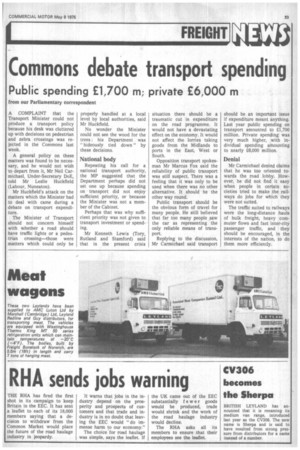Commons debate transport spending
Page 23

If you've noticed an error in this article please click here to report it so we can fix it.
Public spending £1,700 m; private £6,000 m from our Parliamentary correspondent
A COMPLAINT that the Transport Minister could not produce a transport policy because his desk was cluttered up with decisions on pedestrian and zebra crossings was rejected in the Commons last week.
A general policy on these matters was found to be necessary, and he would not wiSh to depart from it, Mr Neil Carmichael, Under-Secretary DoE, told Mr Leslie Huckfield (Labour, Nuneaton).
Mr Huckfield's attack on the matters which the Minister had to deal with came during a debate on transport expenditure.
The Minister of Transport should not concern himself with whether a road should have traffic lights or a pedestrian crossing—those were matters which could only be properly handled at a local level by local authorities, said Mr Huckfield.
No wonder the Minister could not see the wood for the trees : his Department was "hideously tied down" by these decisions.
National body
Repeating his call for a national transport authority, the MP suggested that the Department perhaps did not set one up because spending on transport did not enjoy sufficient priority, or because the Minister was not a member of the Cabinet.
Perhaps that was why sufficient priority was not given to transport investment or spending.
Mr Kenneth Lewis (Tory, Rutland and Stamford) said that in the present crisis situation there should be a traumatic cut in expenditure on the road programme. It would not have a devastating effect on the economy. It would not affect the lorries taking goods from the Midlands to ports in the East, West or South.
Opposition transport spokesman Mr Marcus Fox said the reliability of public transport was still suspect. There was a feeling that it was only to be used when there was no other alternative. It should be the other way round.
Public transport should be the obvious form of travel for many people. He still believed that far too many people saw the car as representing the only reliable means of transport.
Replying to the discussion, Mr Carmichael said transport should be an important issue if expenditure meant anything. Last year public spending on transport amounted to £1,700 million. Private spending was very much higher, with individual spending amounting to nearly £6,000 million.
Denial
Mr Carmichael denied claims that he was too oriented towards the road lobby. However, he did not find it easy when people in certain societies tried to make the railways do jobs for which they were not suited.
The traffic suited to railways were the long-distance hauls of bulk freight, heavy commuter flows and fast inter-city passenger traffic, and they should be encouraged, in the interests of the nation, to do them more efficiently.




























































































































































